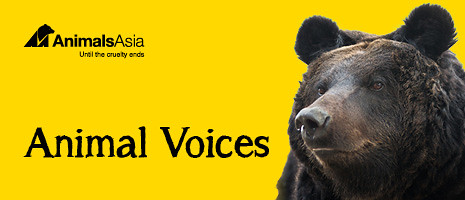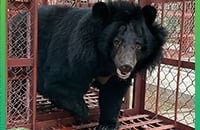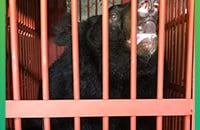It is not all over at Ringling
19 March 2015
By Animals Asia Animal Welfare Director, Dave Neale
The announcement that Ringling Bros will be retiring its 13 Asian elephants is a victory for all of us that understand the physical and the psychological abuse suffered by animals in circuses.
Exposés of the cruelty behind the "greatest show on earth" revealed baby elephants being torn away from their mothers and subjected to violent training sessions. Video evidence showed that elephants performing tricks did so having been whipped, beaten, and yanked by sharp steel-tipped bull hooks behind the scenes.
As one of the world's most well-known circuses, the significance of Ringling's announcement shouldn't be underestimated.
It demonstrates a change in public opinion taking place in the USA, with more and more regional bans being enacted to prevent Ringling and others from exploiting elephants in public arenas.
Ringling have recognised the public shift against the use of animals in performance and have finally taken appropriate action to begin to deal with it.
The change in perspective is clearly international as the use of wild animals in the circus is being hotly discussed in many countries. The use of wild animals in performances is banned in 19 countries while many others have regional, and species-specific bans in place.
Yet, the tide has not yet come fully in, as some countries, such as China are actually expanding their circus industries with bigger and more elaborate animal acts, many of which include elephants.
Those in these newer markets seeking to profit from animal exploitation should sit up and take note of Ringling's decision, for it clearly shows the writing on the wall.
The pace of change is quickening, and public opinion in countries such as China will inevitably turn against this industry in the near future - as it is has done in the USA. And when that happens, no business will see value in exploiting animals so publicly.
But for all the significance of this decision, the champagne should remain on ice. The end of the Ringling elephant show is still three years away, and there has so far been no mention of a total end to the use of other animals in their performances.
Animals such as tigers are likely to continue to suffer up to and beyond 2018.
Ringling have of course taken a very significant first step, but it is clearly only the beginning. It cannot be acceptable to subject animals such as tigers to the brutality we won't put up with for elephants.
Ringling must see this for what it is – an industry in decline as more and more people learn the true nature of the animals with which we share our world and turn their backs on those that wish to harm and ridicule them for profit.
No longer does the crowd want to see magnificent animals brutalised and dominated until they stand on their own heads, or spin around in circles while balancing on one foot. These tricks demean both the animal and those that take pleasure in the suffering.
Ringling's decision is welcomed but it is time for them to go further and show the world that all sentient animals are equally deserving of freedom and dignity – and that the world's most famous circus can be a commercial success without exploiting wild animals. Now that's something I'd pay to see.
BACK







 Freedom after two decades: Moon bears Nang and Mua rescued
Freedom after two decades: Moon bears Nang and Mua rescued
 With heavy hearts we say goodbye to our beloved Tulip
With heavy hearts we say goodbye to our beloved Tulip
 Three moon bears rescued from notorious bear bile farming hotspots in Vietnam
Three moon bears rescued from notorious bear bile farming hotspots in Vietnam
